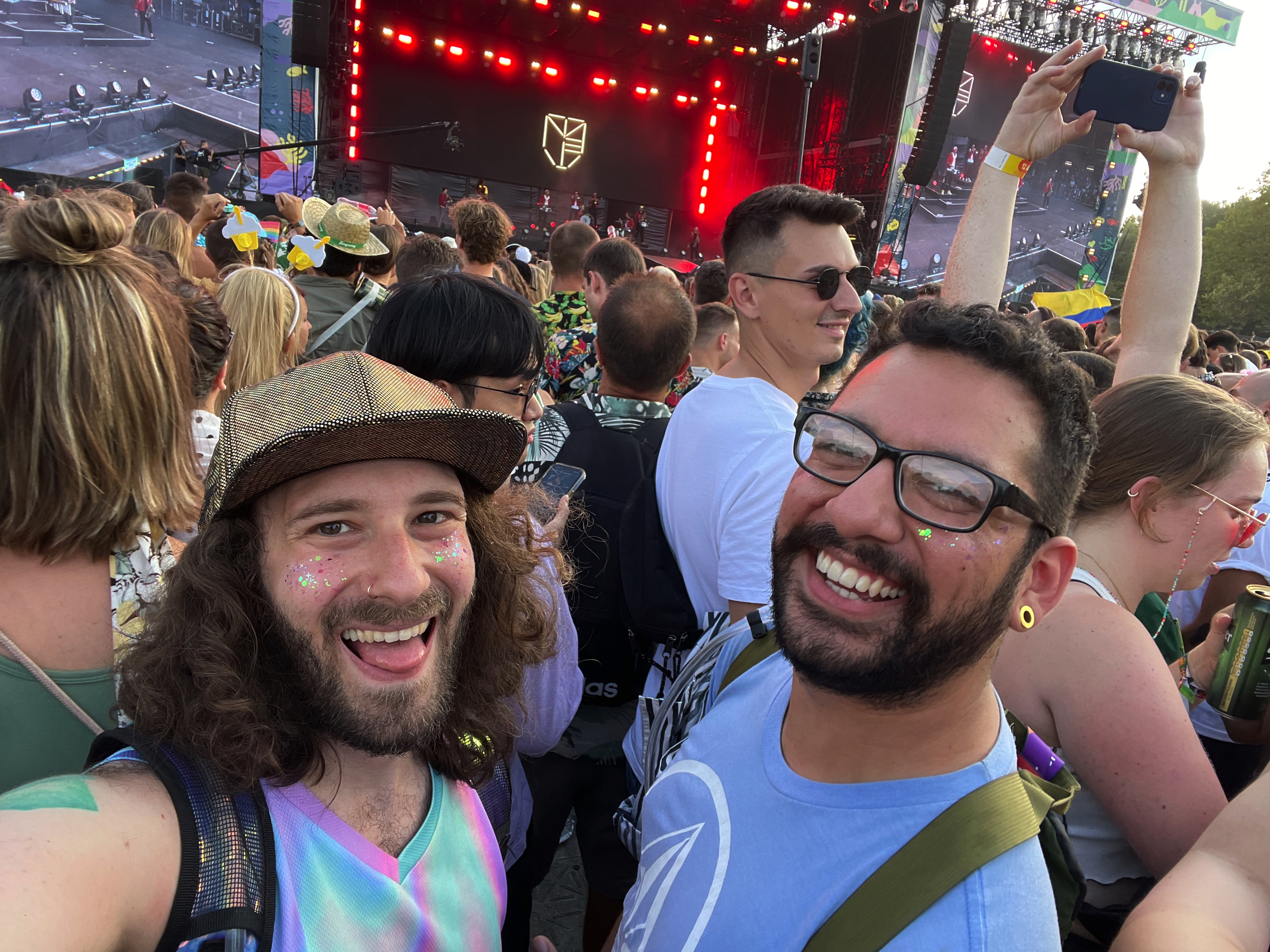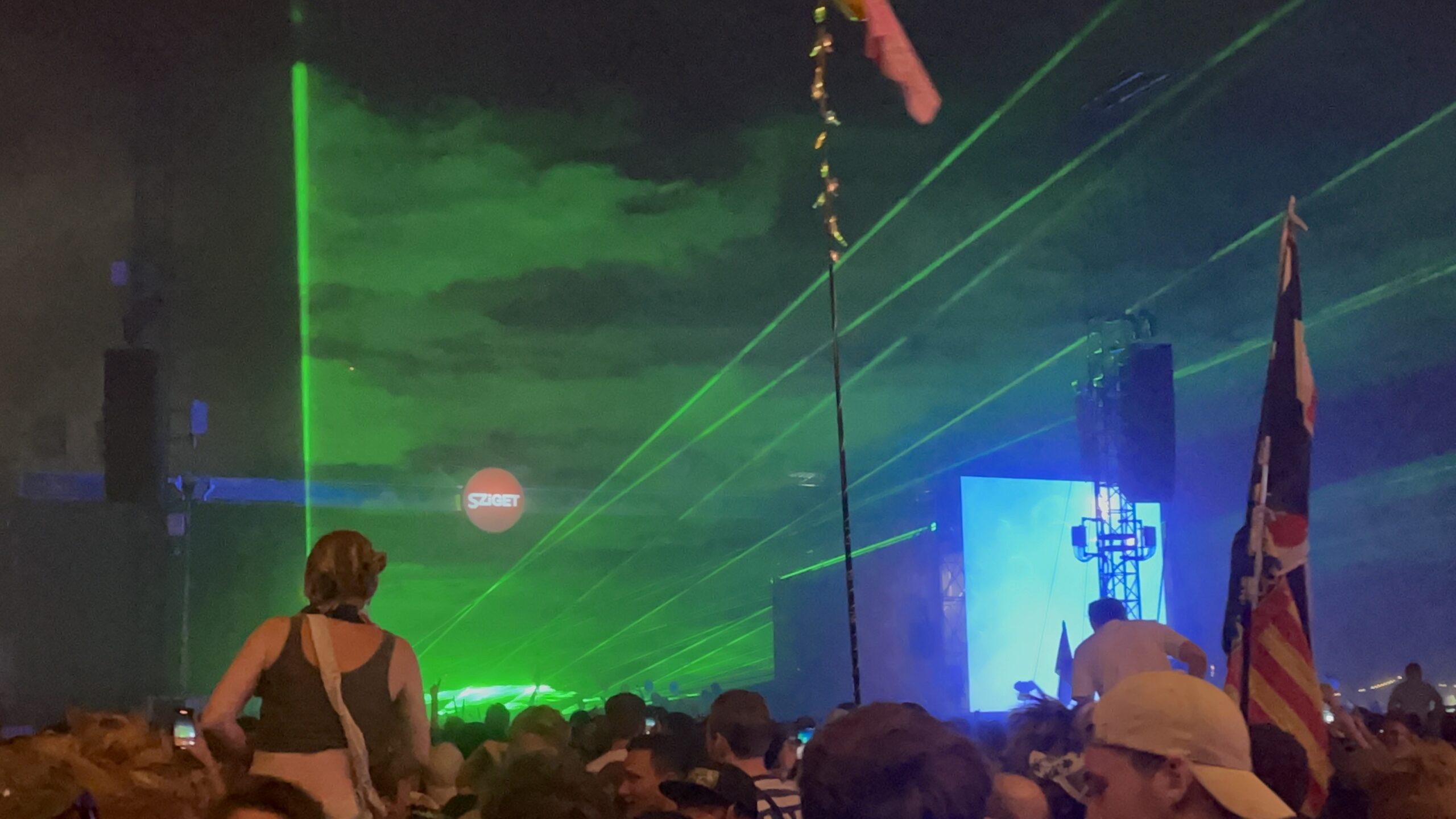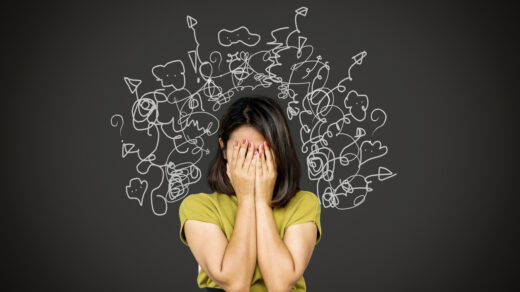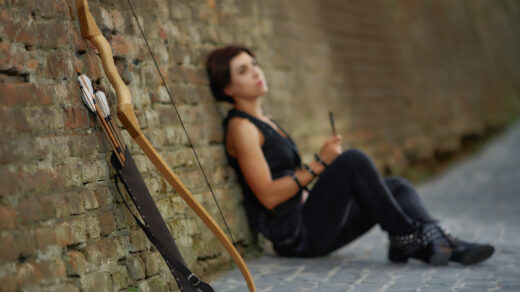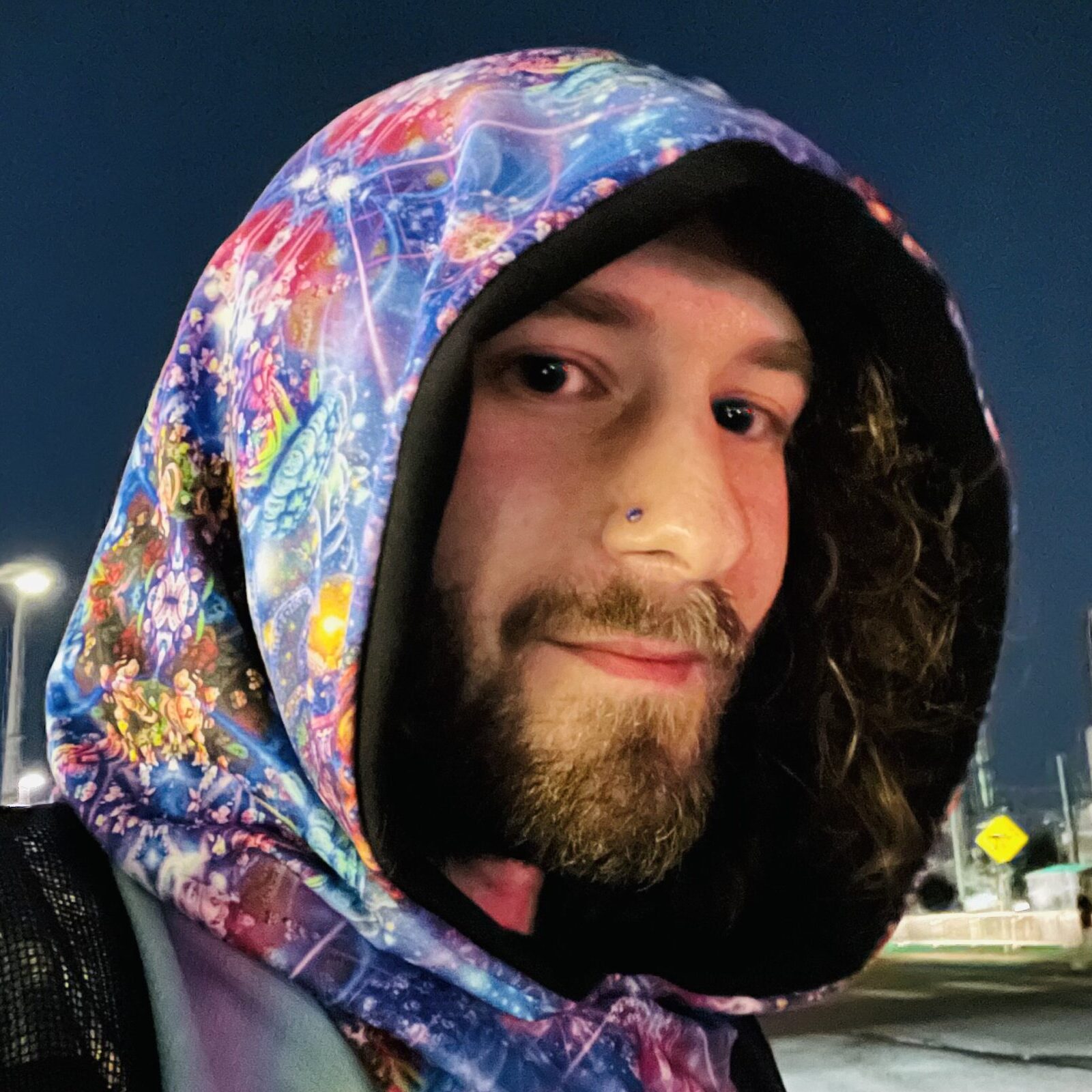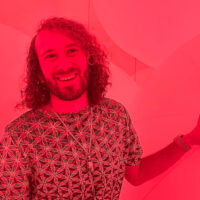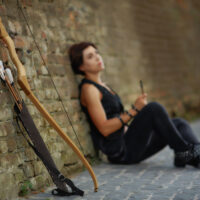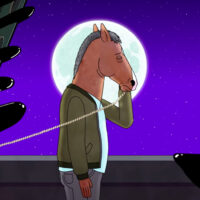Content warnings: mentions child abuse and depression
Disclaimer
Before sharing this story with you, I would like to make a disclaimer about privilege. I feel very lucky to have been able to have this experience. Traveling internationally as a resident of the US already requires a fair amount of financial privilege. In addition, Hungary is not currently doing well geopolitically. Their current prime minister, Viktor Orbán, is a fascist who has been consolidating power while taking away rights for queer people, the media, and others. Not only was their economy already on a downturn, but recently the EU froze funds going to Hungary out of concern for Hungary’s judicial independence. The Hungarian forint is doing so poorly, that many prices for goods in Hungary have been converted to a euro standard. I bought my ticket to Szigetfest in January 2020. When I was finally able to travel to Hungary in August 2022, my dollars were worth a lot. While there, I had spectacular food, and I rarely paid more than 15 USD for a meal with appetizers and drinks downtown. I was lucky enough to meet people in Hungary who shared a lot of the darker details of the country with me. I greatly appreciate the honesty they provided me. For 10 days, I lived like a king, but I would not feel right sharing this story with all of you if I did not preface it by saying that I benefited from a sad, sometimes dangerous situation for others. There are many people in Hungary who could not attend Szigetfest because of the current state of affairs, and there are many people working on leaving Hungary altogether because they no longer have hope while staying.
A person who thinks all the time has nothing to think about except thoughts. So, he loses touch with reality, and lives in a world of illusions. By thoughts, I mean specifically, chatter in the skull. Perpetual and compulsive repetition of words, of reckoning and calculating. I’m not saying that thinking is bad. Like everything else, it’s useful in moderation. A good servant but a bad master. And all so-called civilized peoples have increasingly become crazy and self-destructive because, through excessive thinking, they have lost touch with reality. That’s to say, we confuse signs, words, numbers, symbols, and ideas with the real world. Most of us would have rather money than tangible wealth. And a great occasion is somehow spoiled for us unless photographed. And to read about it the next day in the newspaper is oddly more fun for us than the original event. This is a disaster, for as a result of confusing the real world of nature with mere signs, such as bank balances and contracts, we are destroying nature. We are so tied up in our minds, that we’ve lost our senses…. Time to wake up.
Alan Watts (1969) Why Not Now: The Art of Meditation
Have you ever been on a first date, and the person across from you asks, “What kind of music do you like?” I find it interesting how we meet others and usually assume they enjoy music and have established musical preferences. I mean, we’re not often wrong. But what does it mean to “like” music? I say I like music, but I don’t play any instruments. If someone likes music, does that mean they go to multiple concerts each month? Does it mean they listen to music during their commute? Do they compile playlists of their favorite music? Do they discuss music online and share recommendations with their friends? If someone listens exclusively to “lofi hip hop radio – beats to relax/study to” on YouTube 10 hours a day, do they like music? When your date asks, “What kind of music do you like?” telling them a list of genres or artists in no way communicates how you like to enjoy music.
I love music, especially EDM (electronic dance music). I’m obsessed with it. If I’m in the car, there is music playing. If I’m working (and not talking to clients or coworkers), there is music playing. If I’m relaxing at home and not doing anything in particular, there is music playing. Additionally, I browse the Apple Music “For You” section daily. If you get in my car and ask what’s playing, I may respond, “Oh, I discovered this artist this morning. I’m really into them!” One of my all-time favorite actives in life is celebrating music and the culture surrounding it with others. I didn’t always know this, though.
Music Was a Distraction
Growing up, I was often told what I liked. My dad was not a compassionate listener, and he was regularly preoccupied with his own attachments to the future and his personal plans. Whenever we were celebrating an occasion for someone who wasn’t him (ex: my mom’s birthday or a sibling’s achievement at school), he would ask how they wanted to celebrate. If he didn’t agree with the request, though, he would assure them that they didn’t like whatever was suggested. He would recommend an alternative, and he would tell them that they and the rest of the family actually wanted his suggestion. And then we’d all celebrate by doing what he wanted. Growing up, I was told I enjoyed playing baseball, playing putt-putt golf, and focusing on my goals instead of the people around me. I was assured that I did not want to get a job making less than six figures, that I did not enjoy experimental art, that I did not enjoy being friends with girls, that I did not enjoy school; I could go on and on.
I had an identity forced upon me, and I did not want that identity. Perhaps I could have embraced more of the identity if I was allowed to explore how I wanted to enjoy these aspects of life. When it came to my father, it wasn’t only important that I enjoy and celebrate what was important to his identity, but it was important I enjoyed and celebrated in the same way as him. I was allowed to be excited when we moved back to the US after living abroad for two years. I think my dad was also looking forward to the comfort of cultural familiarity. I was not allowed to be excited to see my friend Joe or the other people I missed while we were abroad, though. Until I cut my dad out of my life in my 20s, it was rare that I identified my own personal preferences, likes, dislikes, etc. outside of, “I know I enjoy it more if my dad’s not interested in it.” This was because, if my dad wasn’t interested in a hobby or activity of mine, he would ignore it as long as it didn’t interfere with school or anything he cared about. I learned at an early age that staying quiet and out of the way was usually a reliable way to avoid getting yelled at or beaten. As a child with ADHD, this could sometimes be incredibly difficult. However, the right music in my earbuds could fill my attention span, saturate it, and help me avoid bringing attention to myself.
Music Was Comfort
I remember once when my family was on vacation, and we were on our way back home in the car. My dad was livid with me; I don’t recall why. Since this was after I came out, he was probably angry because he had somehow been reminded that I was queer. (This was a common occurrence. When he saw people being nice to me, and it was obvious they either knew I was queer or could tell, he would become outraged and throw tantrums.) We were living in Utah at the time and driving through Wyoming on the way home. I remember we stopped at the Little America Hotel in Wyoming. He bought everyone including himself an ice-cream, and he made sure to communicate to the employee that I was not included in his purchase. I felt ashamed and isolated at the time. As a high schooler, I got enough of that bullshit from my peers.
If I’m not mistaken, I listened to One-X by Three Days Grace on repeat until we got home. Sitting in the cramped back seat with my two siblings, I moved my hands and forearms to the music. I restricted my dancing to the parts of my body that wouldn’t bother others, and I kept my movements subtle. I was experiencing so many feelings, and I could barely identify any of them. While I knew I was feeling hurt, why was I feeling hurt? I didn’t even like my dad, and I had felt he despised me since I was very little, so how could he hurt me? I knew I was angry, but I felt I couldn’t do anything about that. There were so many parts in my mind all screaming for attention, all wanting to protect me in their own ways from this man. But as a kid in Utah, I knew I would be living with him until I was at least an adult. And I had learned long ago that standing up to him would only make things worse. At the time, with no way out, I needed some kind of comfort. Three Days Grace was that comfort.
Before high school, I listened to whatever the person driving me somewhere put on. This was usually a popular radio station, so in my earlier years, I knew I enjoyed some pop artists but nothing else. During high school, new music felt like gifts people gave me. My dad was very into music, but I didn’t consider myself a fan of his music. He liked classic rock and some alternative. He owned hundreds of CDs. I would occasionally give some of them a listen. There were a couple I liked and even ripped to my iPod. But I never actually saw him listen to The Killers, Annie Lennox, or Liz Phair in my company, so I never associated them with him. I never listened to the radio myself, and I didn’t have a car. Thus, I learned about music at school when friends would share their earbuds with me or in friends’ cars when they put CDs on. I remember I didn’t like a lot of what my friends listened to, but occasionally, I would notice a song I liked and write it down. Then I would go home, find the album to download and check it out. This is how I learned that I really liked “You’re Gonna Go Far, Kid” by The Offspring but none of their other songs. It’s also how I first heard electronic music. During high school, my brother (if I remember correctly) gifted me the album Elements of Life by Tïesto. I remember bopping my head to Tïesto back then.
The music streaming service Pandora publicly launched in September 2005, a month after I started high school. During my second half of high school, a Pandora station would always be playing when I was working on digital projects or homework. I’d turn a station on in the background and then mark any songs I wanted to find and add to my iPod later. This isn’t meant to be a dig on Pandora or on the emo genre, but my Pandora algorithm eventually started only showing me emo music. There were songs I enjoyed, but I think it put me in an “emo bubble,” in that it was hard for me to hear songs too far outside of the genre. The result was a two-year period of trying new emo artists for a few weeks at a time and moving on. I was listening all the time, but no artists were catching my interest and then retaining it. I recall feeling like I almost liked what I was listening to, but also feeling some frustration that I couldn’t find an artist or style I could reliably turn to for filling silence during homework or downtime.
Somewhere in the middle of high school, my friend Andrew invited me to my first show. I was so surprised. I thought, “Why does this person think I would enjoy a concert?” I wasn’t offended; I was excited. But I was also confused because I didn’t think I had done much to show an interest in music. Perhaps Andrew had observed what was obvious and seen me listening to music every chance I got. Whatever the reason, I think Andrew made the right decision in inviting me. I had never heard of Reel Big Fish before being invited. When I asked what genre they were, he told me, “ska.” I had never heard of ska either. I got permission from my mom, and a few days later, I was at my first show at the Saltair in Salt Lake City.
If you’ve never been to a ska show before, it’s a nonsense fun time. It’s full of absolute goons letting themselves go wild, and I say that with all the love in my heart. My home was one of structure, predictability, and rules. Ska shows are anything but. Andrew and I were in the crowd, and I remember when the mosh pit started during the first song. He pulled me to the edge and gestured to it. The movement had slowed down, and those in the circle were doing what appeared to be a dance in which they walked in an exaggerated manner, while landing their feet to the beat. I asked what they were doing. He informed me they were “skanking.” And then he said to dance however I wanted. The moshing started back up, and he jumped in. Not wanting to feel left out, I looked over the circle, and with a little hesitation, I joined in.
I had a marvelous time. I remember leaving the show and asking Andrew about ska the whole way back to his place. He lent me some Reel Big Fish CDs to listen to. I ripped them to my iPod, and I listened to them over and over again for months. To me, the music was complex and upbeat. Sad songs were still loud and invited me to move around with the beat. Ska felt like alternative rock that was willing to go outside the box. Instead of just a “normal” 4-person band, there were brass instruments too. While jazz was not my day-to-day soundtrack, I knew I enjoyed it. I could hear the elements of jazz that were incorporated into the music. And when I listened to Reel Big Fish, I remembered how much fun I had at the show with Andrew. There was something different to this music, and it resonated with me.
I knew going into college that I would be majoring in mathematics. In spring 2009, I had narrowed down my college choices to a liberal arts school in Salt Lake City, Utah and an engineering school in Golden, Colorado. When I visited the engineering school, I learned that as a math major, I would be expected to integrate my studies into either computer science or engineering to complete my degree. I remember I didn’t like that. While I knew I’d prefer computer science over engineering, I disliked the idea of completing all the programming requirements. I ended up choosing the liberal arts school for this and other reasons. At this school, I was able to connect with people who had the most eclectic music tastes I’d ever been exposed to. I don’t really listen to anything they shared with me anymore, but I’m sure they influenced my tastes in some way. I didn’t feel like I was looking for music at this time since I was receiving so many recommendations, as weird as they often were. Then I studied for a semester in Sydney, Australia, which is where I discovered club music.
I left for Sydney about 6 months before I turned 21, so I was able to start going out to bars early for an American. Many of the friends I made in Australia showed me how to let go and have a good time at the end of a long day. They invited me out clubbing on weeknights and encouraged me to dance with them when I was worried about being judged. I embraced the popular club music of the time and learned that I enjoyed catchy songs produced by DJs who highlighted treble sounds. This was the era of Nicki Minaj’s “Starships”, Avicii’s “Levels”, Calvin Harris’ “Feel So Close”, and Rihanna’s “We Found Love” for me. I feel there was something significant about this time and my musical tastes. Until this point, I dropped artists after a month or two of including them in my rotation. I just got bored with them. Discovering I resonated with remixes and club anthems, this is when I began to follow artists and get excited to listen to their new singles and albums. At this time, the direction of club music was heavily influenced by the aforementioned Calvin Harris, along with David Guetta. I don’t think they drive the direction of the scene like they once did, but they are still incredibly popular and influential.
Around this time, I got to see The Killers twice with my mom. Going with my mom was special to me, and I remember wanting to go because it was with her. I still wasn’t looking for shows myself then; a concert was an event someone invited me to. I wouldn’t have considered choosing to go to a show on my own. Then, about a year after I graduated, I discovered the growing trend at the time that was tropical house, and I started getting ideas about seeing an artist live for the sole purpose of seeing the artist. Tropical house was what it sounds like: house music incorporating elements of tropical music. Tropical house has mostly fallen out of fashion in recent years, but it can still be heard occasionally. I actually saw Klingande, who was very popular at the time, just a few weeks ago. He even had a live saxophonist for the show. In my opinion, though, Kygo will always be the king of tropical house. Listening to tropical house, I felt joy. The incorporation of sounds like snare drums, coupled with Ibiza house influences, brought me immense pleasure. This was also when I started making playlists to keep track of what I liked, as I was starting to follow too many artists to keep track in my head. I remember talking to anyone I could about how much I loved tropical house at the time. Within two years after graduating, I was listening almost exclusively to tropical house and Calvin Harris mixes. I didn’t realize it at the time, but these were the perfect distraction from my lifelong, buried mental health issues, which were rising to the surface.
Music Was a Light in the Dark
I started graduate school in summer 2015, and I started going back to therapy in January 2016. I intended on staying in grad school until 2021 or so to get my PhD (in math), and I left early in 2017. If you’ve ever been in grad school or known a loved one in grad school, you’re probably aware that it sucks. I may explore the difficulties of my grad school experience in a future post. For now, know that I went into a deep depression after starting grad school. I was convinced I had no value to the world and that I would be better off dead. I was miserable almost all the time. Most of my peers in grad school did not want to hear about any of these difficulties. Most of the people I knew during grad school thought my problem was a lack of positive thinking or a lack of faith in god. I felt alone, isolated, and hopeless. I don’t want you to think I was 100% alone, though. I remember three friends who would compassionately listen and not pass judgement when I expressed my darker feelings, but I hated everything else about my life and self while in grad school. (Shout-out to Jenn, Jordan, and James if any of you ever read this.)
When I think about calm times during grad school, I think about walking between my apartment and campus. I think about putting in my earbuds and listening to the album Motion by Calvin Harris, which was released in 2014. I did get to travel to Toronto with a friend to see Kygo during grad school, and it scratched an itch I didn’t know I had. It was my first electronic show, and it was the first time I invited someone else to attend with me. I wanted to go to more electronic shows, but I knew that wouldn’t happen while living in upstate New York. Additionally, like everyone else interested in the genre at the time, I was beginning to listen to less tropical house. I wasn’t sure what I wanted to listen to, though. I remember trying to find new artists and returning to the pattern I followed before going to Australia: I would listen to artists for a few weeks and then drop them. I remember a conversation I had with my friend Jenn about it, as she was having the same problem. Calvin Harris stayed in my rotation, though. Zedd and Galantis were becoming insanely popular at this time, but I didn’t find them. I was living in an area of the country with very little nightlife, and my friends did not listen to the same music as me. I wouldn’t realize my love of Zedd and Galantis until a year or two after I finished grad school. Isolated from my musical peers in upstate New York, I found comfort in Calvin Harris’ music in my darkest times.
During grad school, my friend James recommended to me an artist I had never heard of before: Madeon. Madeon makes really fun music about the hard parts of life. These tracks, for me, are about letting down loved ones, about depression, about anxiety and mania, about not living up to the world’s expectations of us. When James introduced me to Madeon, it was difficult for me to appreciate the music. However, as I prepared to leave grad school and my mental health started to improve, Madeon was incorporated into my heavy rotation. Madeon, I felt, was like me: struggling in this world but pushing through anyway. It’s not enough to resonate with the meaning the music brings me, though. I need to feel the music and want to live in it, and I am in love with Madeon’s style. Currently, I tell people Madeon is my favorite artist. While I am not feeling these feelings in the intense way I used to, I feel energized when I listen to his music and feel like Madeon and I can relate in our journeys through life.
After grad school, I knew I wanted to live somewhere more politically progressive. I didn’t think at all about if the location would have music venues and countless artists coming to play shows. I just knew I was over the predominant, heteronormative, war-on-drugs, god-fearing culture of upstate New York. I chose the Denver/Boulder area in Colorado for many reasons, none of them related to music. However, I find it funny how similar humans can be to each other. We find friends with like interests who introduce us to new ideas. Since we are so similar, we commonly find we enjoy those new ideas. Our interests, hobbies, and passions grow as we allow and encourage this form of cultural sharing. And often, when we meet someone who we already know enjoys a handful of our interests, we are elated to discover they enjoy a ton of other things we already enjoy. If you’ve ever met a new coworker who expresses interest in a TV show you like, and after talking you learn they also like 10 other shows you love, then you’ve experienced what I’m talking about. All of this is to say that, in retrospect, it comes as no surprise to me that I found my tribe in Colorado.
Music Is a Celebration
When I arrived in Colorado, I almost immediately started working in the well known, local industry. Here, I was introduced to more music than I could ever imagine. Everyone was always playing music wherever I went, and I enjoyed a lot of it. What’s more, by learning about different genres and subgenres, I was able to identify and describe my musical tastes with more precision. Exploring artists felt more like an adventure and less of a struggle to find someone I actually liked. I focused too much on work at first, though, and it took me a while to finally start going to shows. Two years after I arrived, I went to my first show at Red Rocks Amphitheatre, and I was hooked. It actually wasn’t an EDM show; it was a String Cheese Incident show with my mom. I knew I needed to see an EDM artist there, though. I wanted more. I wanted more lights, more screens, and more sounds. I wanted to be at the front of the show, and I wanted it in my face. I wanted my sensory experience to be saturated by the show. And it didn’t feel like a distraction or a way to avoid negative feelings. Attending shows, I felt like I was alive for the first time.
I quickly started buying tickets for the artists I knew I liked. I saw Madeon perform his Good Faith show, which was incredibly powerful and moving. Madeon’s Good Faith tour, to me, was like experiencing his music on another level. I felt such an emotional connection to the artist and myself. I started buying tickets to Temple Denver whenever a DJ I liked would be playing a set there. I went to shows for artists I didn’t regularly listen to because I knew the show would be a blast. (deadmau5 in 2019 was so fun that I’m going again this year with a friend from undergrad, and I never listen to deadmau5.)
In January 2020, my close friend Chris and I were browsing upcoming shows to see if we wanted to make any plans. That’s when we saw Calvin Harris was on tour. Both of us were shocked. We thought, “Calvin Harris doesn’t tour the US, does he?” We checked where: a festival we had never heard of in Budapest called “Szigetfest.” We did some research: Szigetfest was affordable at around $200 for the base ticket at the time, and it was a week long in August. The lineup was insane; it was definitely worth it if we could make it happen. We debated together: It sounded like the most significant expense would be the plane tickets, which we estimated we could afford. We asked ourselves, “Are we actually going to do this?” And then we bought our tickets. Two months later, the world went into locked down. We decided we’d hold on to the tickets and see what happened. The worst case would be we got a refund, right?
2020 and the first half of 2021 were mixed bags for me. On the one hand, I was hating lockdown life like most others. On the other, the world had slowed down, and I was addressing my mental health with more patience. In summer 2021, I was starting to think I might one day consider my mental health “stable” or even “in good standing.” I hated my job, though. I left my job at the time, and just before leaving, some friends asked if I wanted to go to a festival in July. While working there, I felt my coworkers and I had only shared little glimpses into our lives. This wasn’t because we didn’t want to; the workplace was horribly toxic and understaffed, which made it difficult to bond and share time with coworkers. This festival invitation reminded me of Andrew back in high school. I excitedly bought my ticket.
Since I say my first Red Rocks show got me hooked, I guess Global Dance 2021 dug its claws into me and never let go. It was a celebration of electronic music and the culture surrounding it, and I got to experience it with my friends. I felt it was magical. I remember coming home and thinking, “I can’t believe I just saw Tïesto. This is insane. I can’t believe I just saw Illenium! I can’t believe how much new music I have in my library!” Some of my friends during the festival told me they had seen Tïesto before. I told them I hadn’t, and this was like a dream come true. I remembered listening to Elements of Life in high school. Back then, I never even considered I might be able to see Tïesto live one day.
Then in fall 2021, I heard about the festival Decadence NYE in Denver. It’s a two-day EDM festival to bring in the new year. I got to see Zedd and other DJs I had been listening to for years at that point. However, looking back at Decadence 2021, what I really remember is the music that was new to me. Zhu brought in the new year, and I was obsessed with their light show. Then Rezz was my first show of 2022 (since she started at 1am). I knew of Rezz before this, but I felt like I was actually hearing her for the first time when I saw her live. I knew bass-heavy EDM wasn’t the music I wanted to listen to day-to-day, but I was also learning there were bass-heavy artists I enjoyed enough live that I would pay good money to see them. And now, if these artists get played when I’m at a party or another show, I dance along, remembering when I had the time of my life seeing them live. Realizing this, I was even more excited for Szigetfest – if it actually happened after all the wait.
I started off 2022 with a new job, and I had more time to go to shows. After the lockdown period, I was antsy to go to more shows. Additionally, I wanted to take any chance I could to see anyone I thought would be a good time. So many shows got canceled or postponed at the start of 2020, and I didn’t want to miss out again.
I’ve noticed I don’t frequently think, “Oh, I wish I was there” or debate last-minute plans in case something better might become available. Maybe that’s why I tend to think I don’t experience FOMO (fear of missing out), though that thought is definitely incorrect. I think there was an element of FOMO here. The feeling I was having was, “I want to see as much as I can in case I don’t have the chance in the future.” To be clear, I don’t regret anything I’ve seen. I’ve seen multiple shows every month of 2022 since April, and I’ve loved it. However, I occasionally need to debate between shows because of the cost. Shows I’m interested in are rarely scheduled to overlap, but I want to avoid spending a lot of money on a show when the cost might cut into affording another one I care more about.
But what if the money didn’t matter? What would I care about then? How would I choose if shows didn’t compete for my wallet?
Szigetfest: How Do I Spend my Time?
My anticipation leading up to Sziget was exhilarating. (Szigetfest is colloquially referred to as just “Sziget.”) After years of waiting and switching between multiple jobs, there were times I wasn’t sure I would be able to go. Maybe the festival would never happen again, or perhaps I wouldn’t be able to afford the cost or time off. But in early summer 2022, I had bought my plane ticket, and most of the lineup had been announced. Calvin Harris would still be a headliner, along with Tame Impala, Dua Lipa, and others. To say I was hyped is an understatement. Szigetfest is a festival for celebrating all kinds of music, not just EDM. There were so many artists attending, and I was excited to be exposed to all the new music. Sziget has an app so that attendees can bookmark what shows they want to go to and get alerts before they start. I had bookmarked the headliners, along with a few DJs I knew, such as Steve Aoki. A lot of the time there, though, I had not planned. I wanted this. I wanted Chris to take me to see artists I didn’t know but he was excited for. I wanted to wander the festival and walk into shows that sounded fun. I didn’t want a day-by-day plan; I wanted to feel free and let the music take over me.
Szigetfest was August 10-15 this year, Wednesday–Monday, and Calvin Harris was the headliner on Saturday. The first headliner was Dua Lipa. I knew I had a handful of Dua Lipa songs in my rotation. Before attending, though, I didn’t consider myself to be a Dua Lipa fan. It turns out, I knew almost all the songs she performed. I thought she would be a fun show. She was an incredible show. I remember watching her and thinking, “I bet this is what it feels like when you see Beyoncé.” It appeared to me that she was commanding the stage with ease while exuding confidence. I was in awe. Like so many other shows I’ve been to, I was marginally excited, and I left with my mind blown. I’m detailing this now because I want to juxtapose this show with Bieber.
Justin Bieber was the headliner on Friday. I definitely don’t consider myself a Bieber fan, but at the same time, I wanted to attend his show. I thought, “I’m here, and it’s freaking Justin Bieber. If I ever wanted to see Bieber, I’d never pay to see him solo.” My logic was, why don’t I see him since I have the opportunity and it’s not costing me anything extra? Considering this, I watched his whole set. I mean no offense if you are a fan of Bieber or if you are Bieber reading this (I doubt it), but I wasn’t really impressed. To be fair, I feel I should tell you: Bieber was diagnosed with Ramsay Hunt syndrome and resumed his tour after a few weeks of recovery. It’s possible I saw Bieber on a very low-energy day. So again, I really don’t mean any offense to Bieber or any of his fans. I didn’t think I’d live for Dua Lipa, but she got me completely into her show. Bieber got a “meh” from me. I meditated on this for a while after his show ended. People will lose their mind and pay $1000 to see Bieber. Meanwhile, my feeling was, “I’m glad I went, and I have no desire to ever see him again.” It got me thinking about experiences and what we choose to spend our money and time on.
As I mentioned in the disclaimer, my experience at Sziget was very affordable for me. It was so affordable, when compared to my budget, that I basically didn’t think about money while I was there. The result was that I was very aware of my time. I wasn’t aware in a “type A” way where I was always looking at my watch, though. It was more that I knew there were shows going on, and I knew when certain artists I really wanted to see were performing. I felt very aware that I could pick where to spend my time at any moment. When I didn’t have anything planned, I would wander around and find something. There were times I’d watch a bit of a set, get bored, walk away, and then jump into a bar where a DJ was live mixing my favorite songs from the last few years. (I heard a fantastic mash-up of Avicii’s “Levels” and GAYLE’S “abcdefu” by a nightclub DJ, and I got out of a food line to dance to a remix of Darude’s “Sandstorm.”.) Once I’d had enough mashups, I’d go see what new shows were happening and jump into one of them. One night, I wandered onto the beach and met a new friend from California, of all places. We danced to a trance DJ’s set on the beach until sunrise. Then I slept until 1pm in a hammock on the beach.
I met some very cool people at Sziget. There were times I would end up talking to someone from another country at 2am for an hour or so. We’d talk about music, life, and our passions. And every so often, my brain would ask me, “Is this what you want to be doing right now? Or do you want to go to a show?” Sometimes at a show, I’d eye the schedule and wonder if I wanted to leave an experience I was really enjoying for another show I was uncertain if I’d enjoy. These thoughts originated from a desire to see everything at Sziget. This reminded me of my anxieties back home during my leisure time. On weekends, I sometimes wonder, “Am I happy with what I chose to fill this weekend with? Would it have been beneficial to fill it with something else? I went to a show on Saturday and then stayed up until 3am talking to my partner about life. So then I slept half of Sunday. Was talking to my partner worth losing half of Sunday?”
I realized that it was impossible to do everything. I was at an international music festival: I wanted to meet people from around the world and share ideas with them. I also wanted to see as many shows as I could and dance as much as I could. I explored these thoughts, and I ended up in a mental state where I asked myself, “Did I have fun?” Because that was all I could really measure my experience by. There was no way to see everything. And there was too much for me to feel like I missed anything once I got home. As long as I saw the names I cared about, everything else was a bonus. I could go see anything I wanted and spend my time however I wanted. If I walked away thinking, “I had so much fun,” then I think I made the right decision. And I was always having fun.
I had solidified this position in my mind and internalized it by Saturday evening. I mentioned earlier in this post that I try to be at the front of a show and feel like my senses are saturated by every part of it. On Saturday, I could’ve been up front for Calvin Harris. But I decided I wanted to be way in the back. I had tested this spot during Bieber and confirmed that the music sounded amazing from any spot. Calvin Harris is a DJ, not a dancer or physical performer. As long as I could see the screens, which I could, I didn’t feel being up front mattered. Additionally, I wanted to dance. I wanted to spread my body out and feel the music. This was Calvin fucking Harris. I had been listening to him for how long now? I knew so many of his songs, in and out. I wanted to let it all go and dance my heart out.
When Harris played “Summer,” feelings hit me hard. I will attempt to name them: melancholy, content, and grateful. I remembered years ago when I was dating my ex, Will. I met Will while studying in Sydney, and we ended up having a three-year long-distance relationship. Late in the relationship, I traveled to Sydney for a month and attended his brother’s wedding. I spent the days preceding the wedding meeting Will’s family and sharing in their family wedding traditions. I met so much of his extended family, and they opened their hearts to me. They were curious, and they asked me about my life. I don’t remember them ever saying judgmental things to me. They wanted me to feel comfortable and welcome. I remember after the wedding, I was sitting in Will’s living room with his immediate family and some of his brother’s friends. The best man had prepared a video of photos and movies of the newlyweds, and the soundtrack was “Summer” by Calvin Harris. The video was lovely: a wholesome portrayal of the newlyweds’ love for each other. Dancing to the live performance of “Summer” in that moment, I remembered the love I saw and experienced during my time with Will’s family. I thought about how I’ll probably never see Will’s family ever again. They live all the way in Australia, and I met most of them only the one time. I don’t see how I’d interact with them again without planning with them to do so. But I felt grateful. I was grateful for the time I had with them, and I felt grateful for the time I had with Will. After the show, I checked the time in Sydney and sent a message to Will. We talk occasionally now. I let him know the feelings that had come up, and I let him know I was profoundly grateful for the time I had with his family. (He was appreciative of my message, by the way.)
During Harris’ show, these thoughts about Will’s family connected back to my thoughts on time and how I wanted to spend it. I realized that right now, watching Calvin Harris, there was literally nothing else I’d rather be doing at this moment. There were multiple other shows at other stages around me that I could go to, and I would absolutely not leave Harris’ show until the end. Watching Calvin Harris, I remembered walking to class during grad school and listening to Motion. I remembered dancing to his Rihanna collaborations in Sydney. I thought about how so much of my musical taste was influenced by Harris’ work. I thought about how I never even considered seeing him, since I always assumed it would be an impossible feat. Watching him, letting the music flow through me, dancing my heart out, feeling humbled at how I was choosing to live in this moment, I started weeping. I kept dancing and singing too. My only currency was time, and it was well spent.
Chris invited me to see French 79 with him after Harris. French 79 was entirely new to me, but Chris’ description had me curious. Immediately after Harris’ set ended, I found a quiet spot and texted my mom the following, which prompted this blog post:
Time is my only currency here. And I used it to see an artist who has shaped so much of my life, since music has historically been something I can take comfort in even at my darkest times. That’s all I can get out right now in words. It’s a very beautiful feeling. I’m currently in the back weeping (not in sadness) and texting you
Once I had composed myself, I made my way to the French 79 show. I fell in love. French 79’s show was all lights, no screens. And moreover, it was primarily white lights. The bigger the artist, the more screens, lights, and lasers they generally get. But there is something intimate about a smaller show with what I would consider a “minimalist” lighting setup. I loved every moment of it. In fact, I have been listening to French 79 the majority of the time I’ve been writing this blog.
I cannot plan “the perfect night.” The best nights of my life always have an element of surprise or unknown to them. They are usually somewhat planned, but the plans leave room for the unexpected. Seeing an artist I’m obsessed with, followed by a new artist I then fall in love with, may be my personal definition of the perfect night.
Life is unfortunately not a music festival. However, I am taking home some exciting ideas from Sziget. Ideas about time, how to spend it, and regretting how it is spent. I love to analyze. I love to ask why. This passion can also be my biggest enemy. I analyze until I cannot see what is in front of me. I speculate until I am convinced of my speculation, and then I find it difficult to accurately perceive the world around me. At Sziget, I let emotions wash over me. I experienced images in my mind of times with loved ones I will never get back and periods of dark depression. I felt feelings like melancholy, and I accepted them. Then, I felt grateful for the moment I was in. And I let that feeling sit with me while I continued to dance. And it was beautiful.

